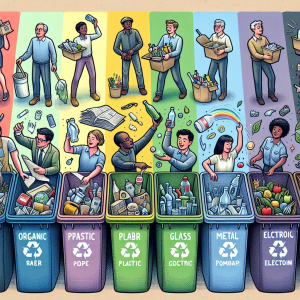Education serves as a critical vehicle for implementing sustainable practices across societies. It empowers individuals with the knowledge, skills, and values necessary to foster environmental stewardship, social responsibility, and economic stability. Educators and policymakers acknowledge the indispensable role education plays in equipping current and future generations to address the complex challenges posed by climate change, resource depletion, and environmental degradation.
To effectively promote sustainable practices, educational institutions must first integrate sustainability into curricula across all levels of education. This integration should encompass both theoretical knowledge and practical application. For instance, science classes can delve into topics such as renewable energy sources, eco-friendly technologies, and conservation strategies. Meanwhile, humanities courses can explore cultural perspectives on sustainability, emphasizing the social dimensions of environmental issues. By embedding sustainability into diverse subject areas, education positions itself as a catalyst for change, fostering holistic understandings of sustainability that transcend disciplinary boundaries.
Teacher training is equally vital in this educational paradigm shift. Teachers must be adequately prepared to engage students with sustainability concepts, necessitating professional development programs that focus on sustainable pedagogies. These programs should provide educators with the tools to inspire critical thinking, encourage problem-solving, and nurture the values essential for sustainable living. A teacher equipped with this knowledge can inspire students to pursue innovative solutions to environmental challenges, thus perpetuating a cycle of sustainability-minded citizens.
Active learning techniques further amplify education’s impact on sustainable practices. By employing project-based learning, experiential learning, and collaborative projects, educators can immerse students in real-world sustainability challenges. For example, students might undertake projects focused on reducing their school’s waste, examining their community’s water consumption, or developing local green initiatives. These hands-on experiences enable learners to apply theoretical knowledge to tangible problems, fostering a deep, actionable understanding of sustainability.
Moreover, education must address accessibility and inclusivity to ensure all individuals are empowered to participate in sustainable practices. Online learning platforms offer increased accessibility, allowing learners from diverse backgrounds to access educational resources on sustainability regardless of geographical barriers. Additionally, incorporating multicultural and interdisciplinary perspectives can enrich sustainability education, promoting an inclusive environment where diverse voices contribute to the dialogue on sustainable practices.
Higher education institutions bear a particular responsibility in cultivating leadership in sustainability. Universities and colleges can serve as living laboratories, implementing sustainable practices within their operations while engaging students in these initiatives. For instance, campuses that prioritize energy-efficient buildings, sustainable food practices, and green transportation options not only reduce their ecological footprint but also model sustainability for their students. Furthermore, academic research conducted within these institutions can drive innovation in sustainability, offering new insights and technologies that contribute to global sustainable development goals.
In fostering a culture of sustainability, partnerships between educational institutions and communities are invaluable. Schools and universities can collaborate with local governments, businesses, and non-governmental organizations to address community-specific sustainability challenges. Such partnerships can result in programs focused on environmental conservation, sustainable agriculture, or urban planning, thereby embedding education for sustainable development within the fabric of society. Engaging communities in sustainability education initiatives ensures that the knowledge and skills developed within educational settings are transferred and applied beyond the classroom.
Furthermore, education for sustainable development (ESD) emphasizes the need for lifelong learning. The rapidly evolving nature of both environmental challenges and technological solutions necessitates continuous education and re-skilling throughout an individual’s life. Offering workshops, seminars, and online courses tailored to various career paths and life stages can ensure that sustainability remains a central focus across generations. Employers can also play a critical role by emphasizing the importance of sustainability-related skills in the workplace, thus encouraging professional development in this area.
Digital technology also offers unprecedented opportunities for education to promote sustainable practices. Online platforms can disseminate knowledge widely and efficiently, while interactive tools such as simulations and virtual reality can provide immersive learning experiences. For example, virtual field trips can bring students into ecosystems they would otherwise be unable to visit, deepening their understanding of biodiversity and conservation efforts. Additionally, social media platforms can facilitate global conversations on sustainability, allowing learners to connect, share experiences, and collaborate on sustainable initiatives worldwide.
Addressing the interconnectedness of global challenges requires an educational focus on systems thinking. Educators must guide students in understanding how environmental, social, and economic systems are interlinked and how decisions in one sphere impact others. This approach encourages holistic problem-solving and emphasizes the importance of considering the long-term implications of actions on the planet’s interconnected systems. Systems thinking empowers learners to become adaptive and forward-thinking, critical traits for leaders in sustainability.
Lastly, education must instill a sense of ethics and values in learners, emphasizing respect for the environment, empathy for future generations, and a commitment to equity and justice. By nurturing these values, education for sustainable development promotes behavior changes necessary for sustainable living. Individuals equipped with both the knowledge and motivation to act responsibly can collectively drive societal shifts towards sustainable practices.
In sum, education plays a multifaceted role in promoting sustainable practices by providing the knowledge, skills, and values necessary to tackle environmental challenges. Through curriculum integration, teacher training, active learning, inclusivity, and community partnerships, educational institutions are well-positioned to drive a transformative agenda for sustainable development. As sustainability becomes an integral part of education at all levels, future generations will be increasingly capable of navigating and resolving the environmental complexities they inherit.

